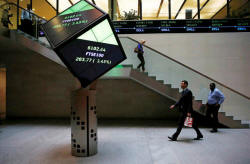|
Bond yields grind to
highest since June, stocks wince
 Send a link to a friend
Send a link to a friend
 [October 17, 2016]
By Marc Jones [October 17, 2016]
By Marc Jones
LONDON
(Reuters) - World stocks started the week in the red Monday as the
dollar touched a 7-month high and U.S. and European government bond
yields - the main driver of global borrowing costs - climbed to their
highest since June.
Riskier assets have had a difficult few weeks, undermined by concerns
about a potential rise in U.S. interest rates, the outcome of U.S.
elections, Britain's departure from the EU and the health of German and
Italian banks.
China and Hong Kong had pulled Asian stocks lower overnight and Europe
fell early on as weak-looking updates from media group Pearson <PSON.L>
and Norwegian seafood company Marine Harvest <MHG.OL> added to nervy
signals from bond markets.
U.S. Treasuries pushed past 1.8 percent, German Bund yields hit
their highest in 4-months ahead of a European Central Bank meeting on
Thursday, while Brexit worries ensured another jittery start for UK
gilts.
Despite the specifics, all the moves came amid signs that inflation is
finally starting to wake from its slumber and that top central banks may
let inflation "run hot" as U.S. Federal Reserve chief Janet Yellen
suggested on Friday.

"We have the two month window where there will be a lot of uncertainty
about what the European Central Bank will do, and we had a poor gilt
opening this morning and that has spooked the market," said Mizuho
interest rate strategist Antoine Bouvet.
"We expected another 20 basis point rise in Bund yields by
mid-November."
Elsewhere in markets, the dollar <.DXY> took a breather after hitting a
seven-month high against a basket of six major currencies and following
its largest weekly rise in more than seven months last week.
That gave some respite to the euro <EUR=> and yen, which had both
touched 2-1/2-month lows of $1.0964 and 104.22 yen per dollar
respectively, although not for the Brexit-battered pound <GBP=> which
slumped back to $1.2160. [GBP/]
Media reports of disagreements between the finance minister and his
cabinet colleagues over the terms of Britain's exit from the European
Union were the latest cause of strife.
The Daily Telegraph said Phillip Hammond could quit his post after he
was excluded from government meetings because he criticized the "hard"
Brexit stance of Prime Minister Theresa May.
Although the Treasury denied that Hammond will quit, it did little to
instill confidence in the pound, traders said.
WEAK AHEAD?
Investors are awaiting a raft of global economic data this week,
including U.S. industrial production on Monday; U.S. and UK consumer
prices, and UK producer prices on Tuesday; and Chinese third-quarter
gross domestic product on Wednesday.
The European Central Bank will publish bank lending figures on Tuesday,
hold its policy meeting on Thursday and euro zone consumer confidence
data for October is due on Friday.

[to top of second column] |

People walk through the lobby of the London Stock Exchange in
London, Britain August 25, 2015. REUTERS/Suzanne Plunkett/File photo

Emerging Asian currencies lost ground on Monday after the comments by
Yellen, which spurred investors to cut bond holdings in the region. [EMRG/FRX]
The
Chinese yuan also weighed as it dropped to its weakest since September
2010 as the central bank in Beijing set its official guidance rate lower again.
China's economy likely grew 6.7 percent in the third quarter from a year
earlier, the same pace as the previous quarter, as increased government spending
and a property boom offset stubbornly weak exports, according to a Reuters poll
of 58 economists.
But analysts are increasingly worried that China's growth is becoming too
reliant on government spending, ballooning debt levels and a housing market that
is showing signs of overheating.
U.S. stock futures fell 0.3 percent. MSCI's broadest index of Asia-Pacific
shares outside Japan had ended down 0.5 percent, with Hong Kong's Hang Seng
hitting 1-1/2-month lows, though the weaker yen helped Japan's Nikkei close up
0.3 percent.
"Markets are reacting to the possibility that the Fed might join the Bank of
Japan in conducting policy to steepen the yield curve," Ric Spooner, chief
market analyst at CMC Markets in Sydney, wrote in a note.
"In
the Fed's case, this might amount to running the gauntlet of higher inflation
with a very slow pace of monetary tightening."
Oil prices, which have risen for four straight weeks, have helped drive the
pickup in inflation globally.
Brent crude futures stood flat at $51.94 in European trade with U.S. crude
futures a shade lower at $50.15 per barrel.

They were capped by a rising rig count in the United States, a strong dollar and
record OPEC-output.
Some market players are wary of a possible hit to investors' risk appetite after
Iraq's Prime Minister Haider al-Abadi announced the start of an offensive to
retake the Iraqi city of Mosul from Islamic State.
(Reporting by Marc Jones; Editing by Alison Williams)
[© 2016 Thomson Reuters. All rights
reserved.] Copyright 2016 Reuters. All rights reserved. This material may not be published,
broadcast, rewritten or redistributed. |